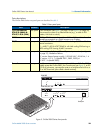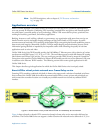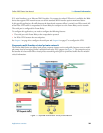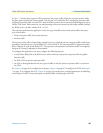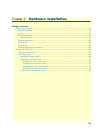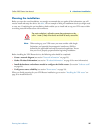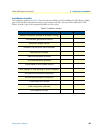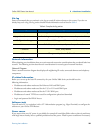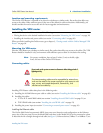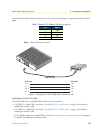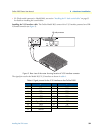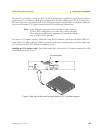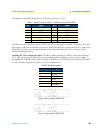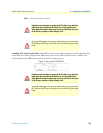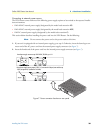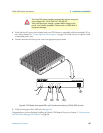
Installing the VPN router 30
OnSite 2800 Series User Manual 2 • Hardware installation
Location and mounting requirements
The OnSite VPN Router is intended to be placed on a desktop or similar sturdy, flat surface that offers easy
access to the cables. Allow sufficient space at the rear of the chassis for cable connections. Additionally, you
should consider the need to access the unit for future upgrades and maintenance.
Installing the VPN router
OnSite VPN Router installation consists of the following:
• Placing the device at the desired installation location (see section “Mounting the VPN router” on page 30)
• Installing the interface and power cables (see section “Connecting cables” on page 30)
When you finish installing the OnSite router, go to chapter 3, “Getting started with the OnSite Managed VPN
Router” on page 38.
Mounting the VPN router
Place the VPN Router on a desktop or similar sturdy, flat surface that offers easy access to the cables. The VPN
Router should be installed in a dry environment with sufficient space to allow air circulation for cooling.
Note
For proper ventilation, leave at least 2 inches (5 cm) to the left, right,
front, and rear of the OnSite VPN Router.
Connecting cables
Installing VPN Router cables takes place in the following order:
1. Installing the 10/100 Ethernet port cable or cables (see section “Installing the Ethernet cable” on page 30)
2. Installing the cables:
a. V.35 or X.21 serial WAN cable (see section “Installing the serial WAN cable” on page 31) or
b. T1/E1 WAN cable (see section “Installing the serial WAN cable” on page 31)
3. Installing the power input (see section “Connecting to external power source” on page 36)
Installing the Ethernet cable
The OnSite 2800 Series has automatic MDX (auto-cross-over) detection and configuration on the Ethernet
ports. Any of the two ports (five on the Model 2805 and three on the Model 2823) can be connected to a host
or hub/switch with a straight-through wired cable (see figure 1). Ethernet devices (10Base-T or 100Base-T) are
Do not work on the system or connect or disconnect cables during periods of
lightning activity.
The interconnecting cables must be acceptable for external use
and must be rated for the proper application with respect to volt-
age, current, anticipated temperature, flammability, and
mechanical serviceability.
WARNING
CAUTION



